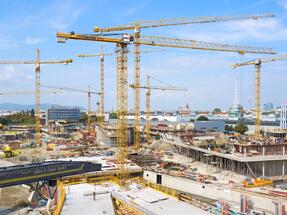The pace of change is rapid; Forecasts seem impossible; social diversity and detailed standardization make it difficult to make clear decisions; Cause and effect are difficult to distinguish from each other. Interest rates, rapidly changing user habits, shorter usage cycles and how to handle them are the topics that concern real estate professionals.
The top 10
1., Usage cycles are getting shorter and shorter - Project development is required to keep space flexible from the outset and to enable various reuse: flexibility, cooling without technology, smart floor plans and control options are required. Intelligent buildings need the market. New usage concepts through digital platforms like "airbnb" can help here.
2., Innovation, digitization and automation - The construction and real estate industry is still working according to old patterns. Industrial prefabrication in construction should change the construction process. This involves immense cost and time savings potential, but also restricts in architecture and possibilities of individualization. Innovation is created through in-house promotion and the involvement of Proptechs.
3., Mobility concepts change the requirement for the real estate - The own car is a concept with expiration date. Even now, the car is less and less important to young people. Fewer parking spaces are needed. What can one do from the much too generous parking possibilities in the inventory? There are also opportunities through the inclusion of new mobility concepts in new real estate.
4., BIM - Costs and benefits of BIM arise at different stages of the lifecycle, and that slows down penetration, although from 2018 all public projects will have to be handled with BIM.
5., New forms of living and affordability - housing needs, forms of housing and sizes are changing. Small apartment sizes increase the care required. Building affordable housing is difficult due to the many public conditions.
6., Corporate culture - companies need to be responsive and well-coordinated. It's getting harder to find the right people and retain them. Common values in the company should enable open and clear communication.
7., Politics demands a lot and acts by leaps and bounds - regardless of whether it's about tenancy law, zoning, environmental guidelines, social requirements, etc., politics requires a lot of cooperation. For example, Startups should be provided with cheap space in new projects. Legal certainty does not seem to exist for dedicated areas.
8., Rising land prices and construction prices - what was too expensive yesterday is today Okkasion. Everything can still be resold, and as a result, the sustainability factor is left behind in some projects. But what happens to buildings that are not built in a flexible and qualitative way when interest rates rise and house prices fall? The topic of conversion is becoming more important.
9., Increasing complexity of projects, especially in the area of district development - neighborhood development is very complex due to many aspects. Environmental regulations, social and economic conditions, technical challenges are just a few of the numerous factors influencing the environment.
10., What happens after the deceleration of the boom? - What happens if interest rate increases, price reductions and maybe even the failure of one of the big players in the market cause the mood to topple? Although the market is secured to a certain extent by sufficient equity capital, the strong capital pressure on the investment real estate market and risky investments pose dangers.
(Source: immobilien-redaktion.at, Walter Senk)


